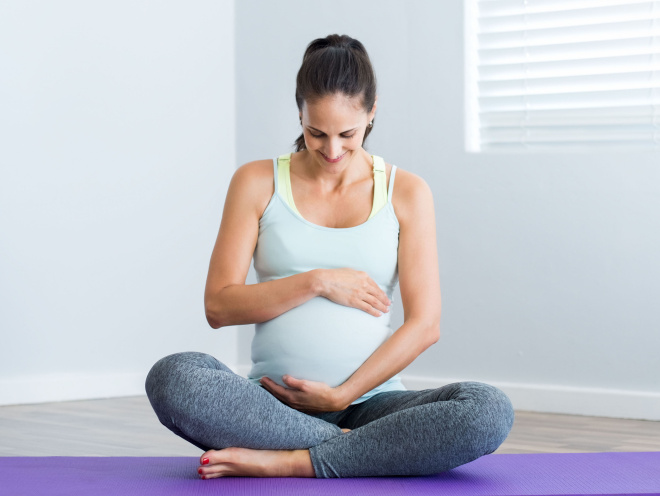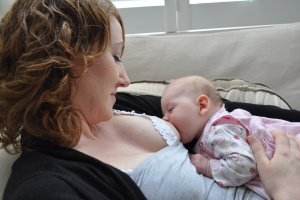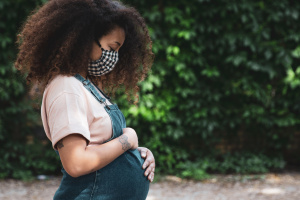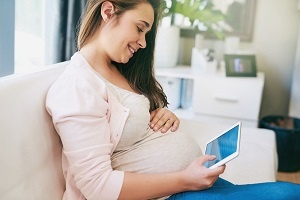Vaccination is the best way to protect against the known risks of COVID-19 in pregnancy for both mother and baby. Find out more below.
The Royal College of Gynaecologists & Obstetricians (RCOG), the NHS and the Joint Committee on Vaccination and Immunisation (JCVI) in the UK all strongly recommend COVID-19 vaccination in pregnancy (RCOG, 2021; NHS, 2022; RCOG, 2022; UK Health Security Agency, 2022). Here's what you need to know about it...
Why is it important to consider the vaccine if you're pregnant?
On 16 December 2021, it was announced that pregnant women are considered a vulnerable group by the JCVI (RCOG, 2021; UK Health Security Agency, 2022).
While some pregnant women who test positive for COVID-19 have no symptoms, more than one in 10 develop a severe infection needing hospitalisation. This is more likely for those: with underlying health conditions; a BMI over 30; aged over 35; or of a Black, Asian, or minority ethnic background (Vousden et al, 2022).
While some research has found an increased chance of becoming very unwell with COVID-19 in the later stages of pregnancy, this hasn't been found in all research. However, there is a higher likelihood of adverse effects for the baby if someone is infected in the eight weeks before they give birth (Vousden et al, 2022).
Having COVID-19 during pregnancy is associated with an increased chance of a baby being born early (before 37 weeks) and spending time in special care. This may be more likely depending on how severe the illness is and can affect around 20% of pregnant women who catch COVID-19 (RCOG, 2022; Vousden et al, 2022). Contracting COVID-19 also makes it more likely for someone to develop pre-eclampsia, or more likely to have an unplanned caesarean or induced labour. The chance of stillbirth is slightly higher, particularly with a severe COVID-19 infection (Gurol-Urganci et al, 2021; Vousden et al, 2022).
Large scale research has shown that receiving the COVID-19 vaccination is a safe way to reduce the incidence of COVID-19, including the rates of severe infection and hospitalisation of the mother. Vaccination reduces the chance of stillbirth and may reduce the chance of premature birth (Gurol-Urganci et al, 2021; RCOG, 2021; Prasad et al, 2022; RCOG, 2022).
Two doses of the vaccination can offer a good level of immunity to the Delta variant of COVID-19 and a third booster dose is recommended to provide the best protection against the Omicron variant (RCOG, 2022). Studies have shown that protective antibodies from the vaccination can travel from the mother to the baby across the placenta or through breastmilk, helping with the baby’s immunity to COVID-19 (RCOG, 2022).
From 1st February to 30th September 2021, 98% of pregnant women admitted to hospital with symptoms of COVID-19 were unvaccinated. Of the 235 pregnant women admitted to intensive care, only three had received a single dose of vaccine, and none had received both doses (UKOSS, 2021).
This Royal College of Midwives (RCM) leaflet has clear information on the COVID-19 vaccination during pregnancy.
You can also watch our video with an expert panel from the Royal College of Obstetricians & Gynaecologists, the NHS and Public Health England.
Who can have the vaccine?
The COVID-19 vaccination is routinely offered to everyone. The decision on whether to have the vaccination is yours. You can find further information in this Royal College of Obstetricians and Gynaecologists (RCOG) information sheet and decision aid sheet, which is there to help you make a personal decision.
There's also this easy-to-read leaflet about the vaccination if you're pregnant or breastfeeding. You can discuss the benefits and risks of vaccination in pregnancy with a trusted person like your doctor or midwife.
If you would like to read more about the recommendations from the Royal College of Obstetricians and Gynaecologists, there are more details here.
Some pregnant women have additional risk factors that may increase the chance of a more serious illness from COVID-19. So you may wish to take these factors into consideration as you make your decision. The additional risk factors are:
- having immune problems
- having diabetes
- having high blood pressure
- having heart disease
- having asthma
- being overweight
- being over the age of 35
- being in your third trimester of pregnancy (over 28 weeks)
- being of Black, Asian, or minority ethnic background.
(UK Health Security Agency, 2022)
Some women using IVF who are receiving immune suppressant therapy may be advised to wait until the effects of this treatment have worn off, because it can reduce the level of immunity given by the vaccine. This can be discussed with your fertility specialist (RCOG, 2022).
What is the evidence of safety?
Studies involving over four hundred thousand women have found that receiving the COVID-19 vaccination reduces the risks associated with COVID-19 and have found no safety concerns (Gurol-Urganci et al, 2021; Prasad et al, 2022). It does not cause miscarriage, stillbirth, low birth weight or congenital abnormalities (RCOG, 2022). Having two doses and a booster of the vaccine provides the best protection for the pregnant woman and their baby (RCOG, 2022).
It is considered safe to have a vaccine dose at any time: pre-conception, while undergoing IVF, during pregnancy or during breastfeeding. As of early 2022, over 200,000 pregnant women have been vaccinated with no adverse effects (UK Health Security Agency, 2022; RCM, 2022; RCOG, 2022). There is no evidence to suggest that the vaccine can affect fertility (NHS, 2022).
As with any vaccinations, there may be mild, short-term side effects, such as having tenderness in the arm, feeling tired or mild, flu-like symptoms that would last less than a week (UK Health Security Agency, 2021). Read about what to expect and how to report any side effects here.
How do I arrange to have the vaccination?
Anyone who is registered with a GP surgery in England can use the NHS website to book a vaccination. You can then discuss the risks and benefits of vaccination with your doctor or midwife (NHS, 2022; UK Health Security Agency, 2022).
Will having the vaccine give me COVID-19?
The COVID-19 vaccines we use in the UK are not 'live' and so do not cause a COVID-19 infection in you or your baby (NHS, 2022; UK Health Security Agency, 2022).
Which vaccine will I have?
When you book your vaccine, you will be offered the most appropriate vaccine for you (NHS, 2022). Pfizer/BioNTech and Moderna vaccines are the preferred vaccines offered to any pregnant woman having their first dose, as these have been more widely studied, with a second dose eight to 12 weeks later (NHS, 2022; UK Health Security Agency, 2022).
If someone has had a different previous vaccination, they will be offered a second dose that is the same as their first one unless they experienced serious side effects (UK Health Security Agency, 2022). It is recommended that three months after the first two doses, a booster is given for maximum protection (NHS, 2022; RCOG, 2022).
Anyone under 40 years old will only be shown appointments for these vaccines, and anyone over 40 will be asked if they are pregnant so they will only be shown appointments for these vaccines (NHS, 2022). For those with additional medical conditions or a reduced immune system, an additional fourth vaccine dose may be offered after six months (RCOG, 2022).
What if I don't want the vaccine, will I lose my protection at work as an at-risk person?
You shouldn’t be put under any pressure to have the vaccine or not have the vaccine. Whether you are vaccinated or not, your employer is required to carry out a risk assessment with pregnant employees that considers the RCOG and RCM guidance on coronavirus in pregnancy (RCOG, 2022).
I’ve read on a forum that I shouldn’t have the vaccine – is this true?
You may find the decision on whether or not to get vaccinated an emotional and difficult one to make. But be aware that many messages on online and other forums are based on individual opinion and not on scientific evidence.
Speaking to a health professional about the vaccine is the best way to get up-to-date and reliable guidance. This RCOG info sheet can also help you make an informed decision.
This page was last reviewed in July 2022.
Gurol-Urganci I, Jardine J, Carroll F, Draycott T, Dunn G, Fremeaux A, et al. (2021) Maternal and perinatal outcomes of pregnant women with SARS-CoV-2 infection at the time of birth in England: national cohort study. Am J Obstet Gynecol. 225(5):522.e1-522.e11. Available at: https://doi.org/10.1016/j.ajog.2021.05.016
NHS. (2022) Pregnancy, breastfeeding, fertility and coronavirus (COVID-19) vaccination. Available at: https://www.nhs.uk/conditions/coronavirus-covid-19/coronavirus-vaccinat… [Accessed 11th July 2022]
Prasad S, Kalafat E, Blakeway H, Townsend R, O’Brien P, Morris E, et al. (2022). Systematic review and meta-analysis of the effectiveness and perinatal outcomes of COVID-19 vaccination in pregnancy. Nat Commun. 13: 2414. Available at: https://doi.org/10.1038/s41467-022-30052-w
RCM. (2022) Should I get the COVID vaccine? Available at: https://www.rcm.org.uk/coronavirus-hub/covid-vaccines-for-pregnant-wome… [Accessed 12 Jul 22]
RCOG. (2021) Information sheet and decision aid. Available at: https://www.rcog.org.uk/guidance/coronavirus-covid-19-pregnancy-and-wom… [Accessed 7th July 2022]
RCOG. (2022) COVID-19 vaccines, pregnancy and breastfeeding. Available at: https://www.rcog.org.uk/guidance/coronavirus-covid-19-pregnancy-and-wom… [Accessed 7th July 2022]
UK Health Security Agency. (2021) What to expect after your COVID-19 vaccination. Available at: https://www.gov.uk/government/publications/covid-19-vaccination-what-to… [Accessed 7th July 2022]
UK Health Security Agency. (2022) COVID-19 vaccination: a guide on pregnancy and breastfeeding. Available at: https://www.gov.uk/government/publications/covid-19-vaccination-women-o… [Accessed 7th July 2022]
UKOSS. (2021) Key information on Covid-19 in pregnancy. Available at: https://www.npeu.ox.ac.uk/ukoss/news/2172-covid-19-in-pregnancy [Accessed 7th July 2022]
Vousden N, Ramakrishnan R, Bunch K, Morris E, Simpson N, Gale C, et al. (2022) Management and implications of severe COVID-19 in pregnancy in the UK: data from the UK Obstetric Surveillance System national cohort. Acta Obstet Gynecol Scand. 101(4):461-470. Available at: https://doi.org/10.1111/aogs.14329







